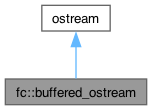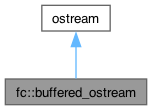Loading...
Searching...
No Matches
fc::buffered_ostream Class Reference
#include <buffered_iostream.hpp>
Inheritance diagram for fc::buffered_ostream:

Collaboration diagram for fc::buffered_ostream:

Public Member Functions | |
| buffered_ostream (ostream_ptr o, size_t bufsize=4096) | |
| buffered_ostream (buffered_ostream &&m) | |
| ~buffered_ostream () | |
| buffered_ostream & | operator= (buffered_ostream &&m) |
| virtual size_t | writesome (const char *buf, size_t len) |
| virtual size_t | writesome (const std::shared_ptr< const char > &buf, size_t len, size_t offset) |
| virtual void | close () |
| virtual void | flush () |
Detailed Description
Definition at line 52 of file buffered_iostream.hpp.
Constructor & Destructor Documentation
◆ buffered_ostream() [1/2]
| fc::buffered_ostream::buffered_ostream | ( | ostream_ptr | o, |
| size_t | bufsize = 4096 ) |
Definition at line 153 of file buffered_iostream.cpp.
155 {
156 }
◆ buffered_ostream() [2/2]
| fc::buffered_ostream::buffered_ostream | ( | buffered_ostream && | m | ) |
Definition at line 158 of file buffered_iostream.cpp.
159 :my( fc::move(o.my) ){}
◆ ~buffered_ostream()
| fc::buffered_ostream::~buffered_ostream | ( | ) |
Definition at line 167 of file buffered_iostream.cpp.
167{}
Member Function Documentation
◆ close()
|
virtual |
Definition at line 202 of file buffered_iostream.cpp.
Here is the call graph for this function:

◆ flush()
|
virtual |
Definition at line 181 of file buffered_iostream.cpp.
182 {
183#ifndef NDEBUG
184 // This code was written with the assumption that you'd only be making one call to flush
185 // at a time so it reuses _shared_write_buffer. If you really need to make concurrent calls to
186 // flush(), you'll need to prevent reusing _shared_write_buffer here
187 struct check_buffer_in_use {
188 bool& _buffer_in_use;
189 check_buffer_in_use(bool& buffer_in_use) : _buffer_in_use(buffer_in_use) { assert(!_buffer_in_use); _buffer_in_use = true; }
190 ~check_buffer_in_use() { assert(_buffer_in_use); _buffer_in_use = false; }
191 } buffer_in_use_checker(my->_shared_write_buffer_in_use);
192#endif
193 const size_t write_buffer_size = 2048;
194 if (!my->_shared_write_buffer)
196
197 while( size_t bytes_from_rdbuf = static_cast<size_t>(my->_rdbuf.sgetn(my->_shared_write_buffer.get(), write_buffer_size)) )
198 my->_ostr->write( my->_shared_write_buffer, bytes_from_rdbuf );
199 my->_ostr->flush();
200 }
Here is the caller graph for this function:

◆ operator=()
| buffered_ostream & fc::buffered_ostream::operator= | ( | buffered_ostream && | m | ) |
Definition at line 161 of file buffered_iostream.cpp.
162 {
163 my = fc::move(i.my);
164 return *this;
165 }
◆ writesome() [1/2]
|
virtual |
This method will return immediately unless the buffer is full, in which case it will flush which may block.
Definition at line 169 of file buffered_iostream.cpp.
170 {
174 }
Here is the call graph for this function:

Here is the caller graph for this function:

◆ writesome() [2/2]
|
virtual |
Definition at line 176 of file buffered_iostream.cpp.
177 {
179 }
virtual size_t writesome(const char *buf, size_t len)
Definition buffered_iostream.cpp:169
Here is the call graph for this function:

The documentation for this class was generated from the following files:
- libraries/fc/include/fc/io/buffered_iostream.hpp
- libraries/fc/src/io/buffered_iostream.cpp